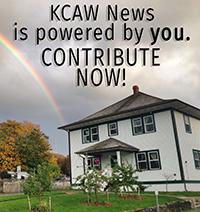
Alaska Bar Association president Darrel Gardner (l.) and pro bono director Krista Scully visited Sitka on a swing through Southeast this week. According to Scully, one limiting factor in the state’s ability to provide legal services for low-income residents: Alaska has no law school. “Law students play a really big part in Access to Justice,” she says. “They create clinics and help people in a way that we don’t have in Alaska.” (KCAW photo/Robert Woolsey)
Although it’s possible to obtain some generic legal services online, there’s really nowhere for low-income Alaskans to turn when they have a legal problem that requires a lawyer.
The Alaska Bar Association is working to change that. ABA president Darrel Gardner and pro bono director Krista Scully have been touring Southeast communities this week to generate interest about two of the Bar Association’s projects to ensure all Alaskans get the help they need.
Alaska is one of seven states to receive a grant of $100,000 this year to map the availability of legal services — which communities have courts and attorneys, and how accessible they are. It goes without saying that these services can be thinly distributed in the more remote parts of the state.
But legal problems can crop up no matter where you live.
“Family issues, domestic violence issues, landlord-tenant law, housing issues, benefits issues…” says Darrel Gardner, a lifelong Alaskan, and the 64th president of the Alaska Bar Association.
“A recent study in the past year shows that 86-percent of low-income Americans have had legal problems within the last year and received little or no legal advice.”
With data supplied by the Justice for All grant, the Alaska Bar Association is hoping to create an online legal portal that allows Alaskans to connect with real legal advice. The Alaska Bar has partnered with its counterpart in Hawaii, and engineers at Microsoft to develop the software.
So why not just use LegalZoom, or other existing legal service that charges a flat fee for a variety of products?
Gardner says that the legal needs of low-income Alaskans often are intertwined with social problems that commercial software can’t address.
“And it’s not just legal issues. It’s also designed to determine if they have mental health issues, or substance abuse issues, or economic issues, or job-related issues. And this one portal will include references to resources for all sorts of issues that may be underlying what looks on its face to be a legal issue.”
 Krista Scully is director of the Alaska Bar Association’s pro bono program. She says that the ABA’s portal is in its infancy. But she was extraordinarily encouraged by the turnout at a meeting with Microsoft developers in Anchorage last week.
Krista Scully is director of the Alaska Bar Association’s pro bono program. She says that the ABA’s portal is in its infancy. But she was extraordinarily encouraged by the turnout at a meeting with Microsoft developers in Anchorage last week.
“There were about 50 justice professionals in the room that day, and we all left so energized and excited by this opportunity.”
Scully says the project is bringing together groups of professionals who have been “working in silos,” but share the same demographic of clients.
“So there were people in the room from housing, medical. I completely fan-girled out over the fact that the librarians were there. And Veterans’ Affairs, language access organizations. So we’re just very excited that everyone is working together on this.”
The service will be pro bono for Alaskans who meet the income threshold — that’s legal-speak for free, or “for the good.” No one requires lawyers to volunteer their time, but Bar Association president Gardner says 50 hours a year is a practical guideline. Alaska is a huge state, but he says the legal profession is a small community — and one that cares.
“We all have to go to work. We all have to pay our rent and buy groceries. But I think as attorneys we have a special duty: We’re social caretakers, in a way, of the rule of law. And we have a special obligation that’s in our Oath of Attorney, and in our profession, to give back to the community, and give back to our profession.”
Gardner is an assistant federal defender in the United States Courts in Anchorage. He’ll serve one year as president of the Alaska Bar Association — until next May.
It’s a tradition for the president of the Bar to tour the state every year and meet with lawyers — in a different region once every four years. On this trip, Gardner and Scully toured Juneau, Ketchikan, Sitka, and Bethel.






























